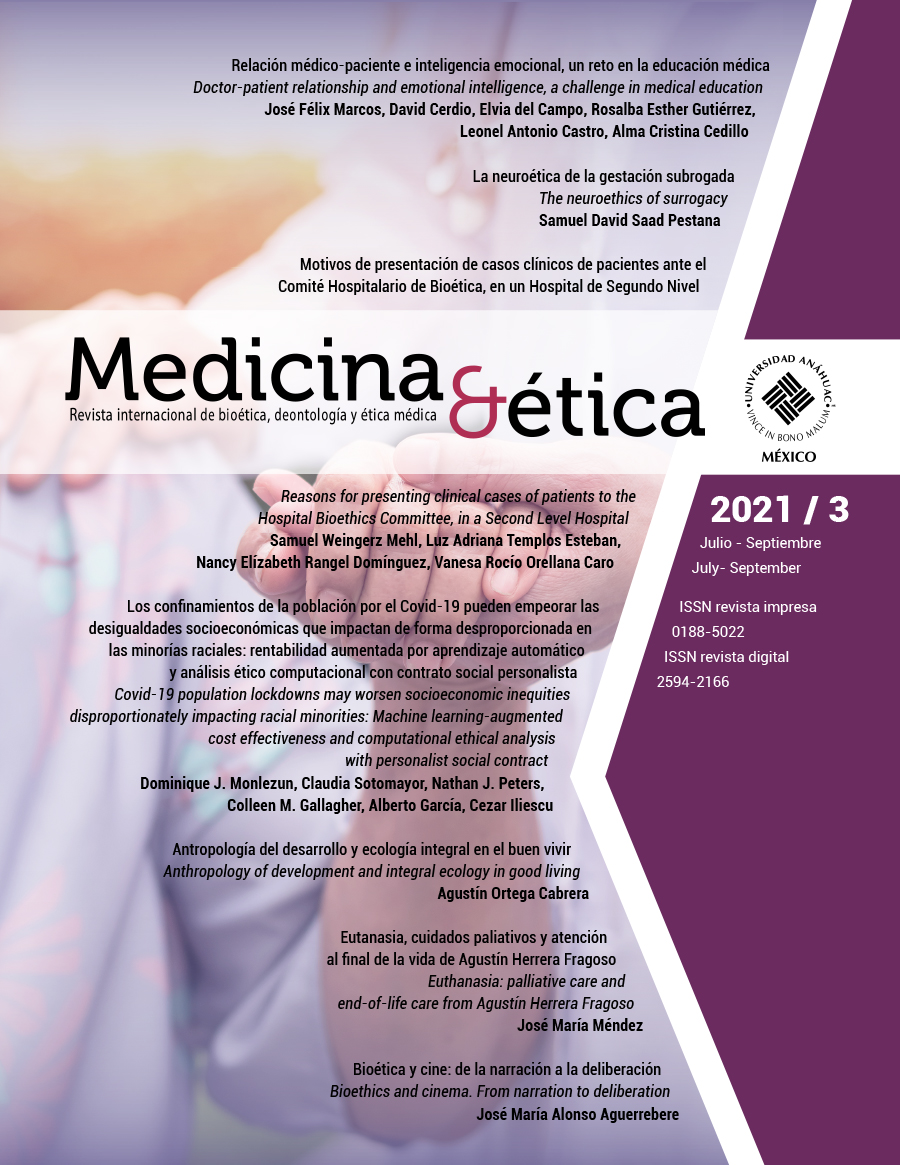Antropología del desarrollo y ecología integral en el buen vivir
Contenido principal del artículo
Resumen
Este trabajo recoge diversas claves y puntos que sustentan la base antropológica del desarrollo humano integral, con sus aspectos antropológicos constitutivos, para un buen vivir. Se exponen y profundizan apuntes o tesis sobre estas cuestiones tan importantes e imprescindibles del pensamiento social y de la ética, de la teología y de la moral, como es la Doctrina Social de la Iglesia (DSI). Contiene también referencias y aportes del magisterio de los papas contemporáneos hasta llegar al papa Francisco.
Downloads
Detalles del artículo
Sección

Esta obra está bajo una licencia internacional Creative Commons Atribución-NoComercial-CompartirIgual 4.0.
Medicina y Ética se distribuye bajo Licencia Creative Commons Atribución-NoComercial-CompartirIgual 4.0 Internacional.
El autor conserva los derechos patrimoniales sin restricciones y garantiza a la revista el derecho de ser la primera publicación del trabajo. El autor es libre de depositar la versión publicada en cualquier otro medio, como un repositorio institucional o en su propio sitio web.
Cómo citar
Referencias
2. VV.AA. Ecoteología, un mosaico. Bogotá: San Pablo; 2016.
3. Vázquez Carballo J. M. Trinidad y sociedad. Salamanca: Sec. Trinitario; 2009. 4. González-Carvajal L. Entre la utopía y la realidad: curso de moral social. San- tander: Sal Terrae; 2000.
5. Díaz C. Pedagogía de la ética social. Para una formación en valores. México: Trillas; 2004.
6. Tortosa JM. El juego global. Maldesarrollo y pobreza en el capitalismo mundial. Barcelona: Icaria; 2001.
7. Sorge B. Introducción a la Doctrina Social de la Iglesia. Santander: Sal Terrae; 2017.
8. Lluch E. Una economía que mata. El papa Francisco y el dinero. Madrid: PPC 2015.
9. Gasda E. Cristianismo y economía: repensar el trabajo más allá del capitalis- mo. Madrid: HOAC; 2017.
10. Carrera J, Puig LL. Hacia una ecología integral. Barcelona: CiJ; 2017.
11. VV. AA. Ecoteología, un mosaico. Bogotá: San Pablo; 2016.
12. Flecha JR. El respeto a la creación. Madrid: BAC; 2001.
13. Alburquerque E. Matrimonio y familia: teología y praxis cristiana. Madrid: San Pablo; 2004.
14. Sols Lucía J. (ed.). Pensamiento social abierto al siglo XXI. Santander: Sal Te- rrae; 2014.
15. Guerra R. Para comprender la Amoris Laetitia. Medellín; 2017; 43(168): 409- 447.
16. Calero R. Los cimientos de un mundo sostenible. Las Palmas: Centro de la Cultura Popular Canaria; 2012-2007.
17. Domínguez XM. Antropología de la familia. Madrid: BAC; 2007.
18. Sols Lucía J. Cinco lecciones del pensamiento social cristiano. Madrid: Trotta; 2013.
19. Domingo Moratalla A. Ética para educadores. Madrid: PPC; 2009.
20. Díaz Salazar R. Educación y cambio ecosocial. Madrid: PPC; 2016.
21. González-Carvajal L. El clamor de los excluidos. Santander: Sal Terrae; 2009. 22. Scanonne, JC. La teología del pueblo. Raíces teológicas del papa Francisco. Santander: Sal Terrae; 2017. https://doi.org/10.15448/1980-6736.2018.2.32701 23. Domingo Moratalla A. Condición humana y ecología integral. Horizontes edu- cativos para una ciudadanía global. Madrid: PPC; 2017.
24. Elizalde A. Desarrollo humano y ética de la sostenibilidad. Madrid: PPC; 2009. 25. González-Carvajal L. El hombre roto por los demonios de la economía. San- tander: Sal Terrae; 2010.
26. Segovia JL. El capital contra el trabajo. Madrid: HOAC; 2013.
27. Samour H. Crítica y liberación. Valencia: ADG-N; 2012.
28. Díaz Salazar R. (ed.) Justicia global. Barcelona: Icaria; 2002.

